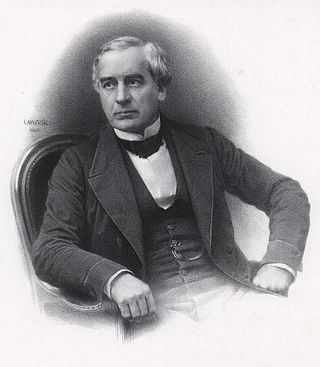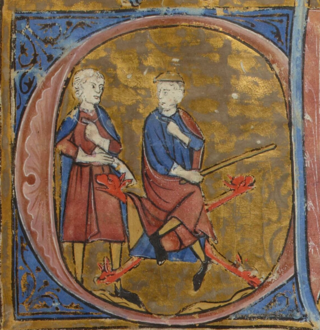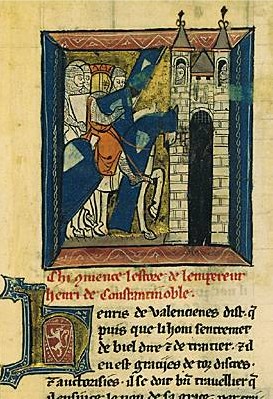Related Research Articles

François Élie Jules Lemaître was a French critic and dramatist.

The Organon is the standard collection of Aristotle's six works on logical analysis and dialectic. The name Organon was given by Aristotle's followers, the Peripatetics, who maintained against the Stoics that Logic was "an instrument" of Philosophy.

Jules Barthélemy-Saint-Hilaire was a French philosopher, journalist, statesman, and possible illegitimate son of Napoleon I of France.

Shawiya, or Shawiya Berber, also spelt Chaouïa, is a Zenati Berber language spoken in Algeria by the Shawiya people. The language's primary speech area is the Awras Mountains in Eastern Algeria and the surrounding areas, including parts of Western Tunisia, including Batna, Khenchela, Sétif, Oum El Bouaghi, Souk Ahras, Tébessa and the northern part of Biskra. It is closely related to the Shenwa language of Central Algeria.
De Interpretatione or On Interpretation is the second text from Aristotle's Organon and is among the earliest surviving philosophical works in the Western tradition to deal with the relationship between language and logic in a comprehensive, explicit, and formal way. The work is usually known by its Latin title.

The Sequence of Saint Eulalia, also known as the Canticle of Saint Eulalia is the earliest surviving piece of French hagiography and one of the earliest extant texts in the vernacular langues d'oïl. It dates from around 880.
Jean Haudry was a French linguist and Indo-Europeanist. Haudry was generally regarded as a distinguished linguist by other scholars, although he was also criticized for his political proximity with the far-right. Haudry's L'Indo-Européen, published in 1979, remains the reference introduction to the Proto-Indo-European language written in French.

Johannes de Garlandia or John of Garland was a medieval grammarian and university teacher. His dates of birth and death are unknown, but he probably lived from about 1190 to about 1270.
Pierre Bec was a French Occitan-language poet and linguist. Born in Paris, he spent his childhood in Comminges, where he learnt Occitan. He was deported to Germany between 1943 and 1945. After returning, he studied in Paris, where he graduated in 1959. He was one of the founders of the IEO or Institut d'Estudis Occitans as well as its president from 1962 to 1980.

Anglo-Norman, also known as Anglo-Norman French, was a dialect of Old Norman that was used in England and, to a lesser extent, other places in Great Britain and Ireland during the Anglo-Norman period.

Henri Wittmann is a Canadian linguist from Quebec. He is best known for his work on Quebec French.

South Oran Berber, or Tachelhit, is a cluster of the Zenati languages, which belong to the Berber branch of the Afroasiatic family. It is spoken in a number of oases of southwestern Algeria and across the border in Morocco.

Guillaume le Vinier (c. 1190–1245) was a cleric and trouvère, one of the most prolific composers in the genre. He has left compositions in all the major subgenres of trouvère poetry: chansons d'amour, jeux-partis, a lai, a descort, a chanson de mal mariée and a ballade. He wrote Marian songs and even an imaginary dialogue with a nightingale. His work can be dated with some precision: the poem "En tous tens" is quoted in the Roman de la violette, which was written around 1225.
The Taensa language was spoken by the Taensa people originally of northeastern Louisiana, and later with historical importance in Alabama. Though poorly documented, it was probably a dialect of the Natchez language. It was also the subject of controversy beginning in 1880–1882, when a French student published a grammar and sample texts of a language that he claimed to be Taensa, though it bore no resemblance to Natchez — these publications are generally considered to be a hoax and the language it described to be invented.

Francine Caron is a French writer and poet.

Maurice Gross was a French linguist and scholar of Romance languages. Beginning in the late 1960s he developed Lexicon-Grammar, a method of formal description of languages with practical applications.
Alexandru Rosetti was a Romanian linguist, editor, and memoirist.

The tale of Phyllis and Aristotle is a medieval cautionary tale about the triumph of a seductive woman, Phyllis, over the greatest male intellect, the ancient Greek philosopher Aristotle. It is one of several Power of Women stories from that time. Among early versions is the French Lai d'Aristote from 1220.

Henry of Valenciennes was an early 13th-century French writer, historian and chronicler of the Latin Empire.
References
- ↑ W. W. Kibler ed., Medieval France (1995) p. 842
- ↑ E. Butler, The Bellum Grammaticale and the Rise of European Literature (2013) p. 49
- ↑ Zufferey, François (2004). "Un problème de paternité: le cas d'Henri d'Andeli. II. Arguments linguistiques". Revue de linguistique romane (68): 57–78.
- ↑ Zufferey, François (2004). "Henri de Valenciennes, auteur du Lai d'Aristote et de la Vie de saint Jean l'Évangéliste". Revue de linguistique romane (69): 335–358.
- ↑ E. Butler, The Bellum Grammaticale and the Rise of European Literature (2013) p. 47-9
- ↑ Helen Waddell, The Wandering Scholars (1968) p. 141-2